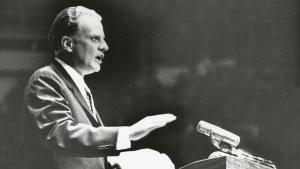A few years back, my wife was describing me to some new friends. When she used the word evangelical, their faces twisted as if they’d eaten a moldy lemon. She realized immediately that she had meant one thing by the word and her new friends understood another.
They understood evangelical to mean:
♦ Politically Republican and right-wing
♦ Anti-gay
♦ Anti-intellectual
♦ Angry and hateful
♦ Probably racist
My wife meant I was:
♦ Christ- and Bible-centered in my faith
♦ Open to engaging culture constructively
♦ Intellectually curious
♦ Politically independent
 The word evangelical has a long history, going back about three hundred years in England to describe a movement intended to revive the token Christianity that was widespread at the time. In the mid-twentieth century, Billy Graham (who welcomed Catholics and African Americans) adopted the label to distinguish himself from fundamentalists. This latter group emerged in the early twentieth century, coming to national attention with the Scopes Monkey Trial of 1925. They believed the Bible was literal and inerrant, were doctrinally conservative, anti-science, and separated themselves from mainstream culture as well as from any believers who didn’t agree with them.
The word evangelical has a long history, going back about three hundred years in England to describe a movement intended to revive the token Christianity that was widespread at the time. In the mid-twentieth century, Billy Graham (who welcomed Catholics and African Americans) adopted the label to distinguish himself from fundamentalists. This latter group emerged in the early twentieth century, coming to national attention with the Scopes Monkey Trial of 1925. They believed the Bible was literal and inerrant, were doctrinally conservative, anti-science, and separated themselves from mainstream culture as well as from any believers who didn’t agree with them.
If fundamentalists sound like what my wife’s friends meant by evangelical, it’s not a coincidence. As I’ve written here before, a few decades ago, fundamentalists in the U.S. began dropping that label (partially to avoid confusion with Muslim fundamentalists) and adopted (co-opted?) the term evangelical.
In addition, the former fundamentalists became more politically active and power focused, beginning a series of moves within Christian denominations and organizations to wrest control from “moderates” (most notably among Southern Baptists).
Evangelical social involvement has seen many changes over the centuries. Two hundred years ago evangelicals were at the forefront of ending slavery, reducing alcoholism, fighting poverty, and defending Cherokee rights. A hundred years later, however, fundamentalists had withdrawn from the public sphere.
Now those who formerly called themselves fundamentalists have become much more socially and politically engaged. Today they support pro-life causes, second amendment rights, a strong military, and advocate restricting voting rights, immigration, and affirmative action for minority groups. These last three are often seen as evidence of racist outlooks.
The political emphasis in the U.S. of today’s evangelicals has come to dominate what Americans understand by the term, as it did for my wife’s friends.* This is both because the media views everything through the single lens of politics and because of the movement’s own emphasis on a political program at the expense of a spiritual one.
All this leaves me with a problem. While I’ve considered myself an evangelical for decades, it has become a problematic label to use. It doesn’t seem to communicate the right things to anyone. I don’t think I’ve changed over the years from what my wife meant by calling me evangelical, but the meaning of the term has changed all around me.
___
*Evangelicalism (in the original sense) is not just a North American or Western phenomenon. It is a worldwide movement estimated to encompass 600 million people. For most of these, it is religious and spiritual in nature and not associated with any political party or philosophy.
Photo credit: InterVarsity Christian Fellowship/USA, Urbana 64.

I feel like my evangelicalism is more like ordering from a Chinese menu. I feel I embody some things from Column A (your wife’s list) some from Column B (The list from the paragraph beginning, “Evangelical social involvement…”), and some from Column C (The list from the paragraph beginning Now Those Who Formally…”). Co-opted is certainly a good word to describe how second amendments rights got ties in with putting others needs above your own. Philippians 2:5 says we should have the same mindset as Christ Jesus. I can’t believe that so many think that mindset means we should stand up for our rights, When Philippians 2:6 says the exact opposite. Perhaps if Evangelical Christians focused more on Christ and less on Evangelical they’d have a more coherent message to tell.
Well said, Dave. Society and the church is such a mishmash these days, it feels like sometimes I stand with everyone and no one. I agree that looking to Christ as our lodestar is a much better option. But with so much flack exploding around us, it’s hard to keep our focus.